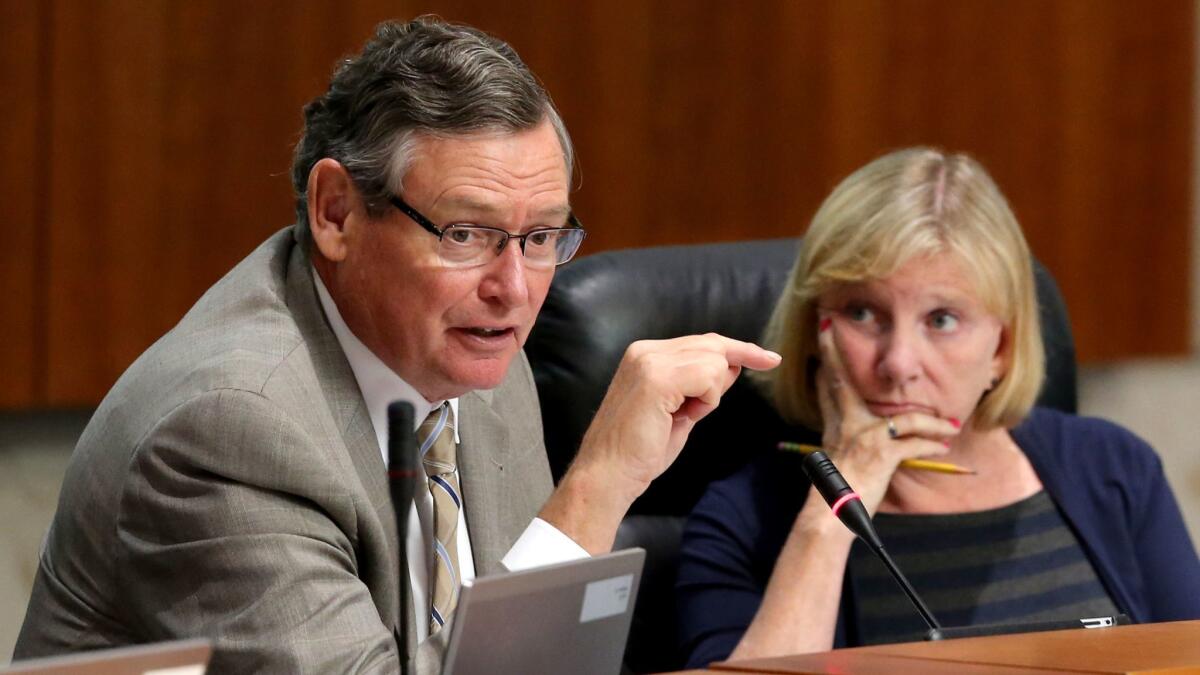Cal State turned away 32,000 students because campuses were too full to accommodate them. Now, trustees will focus on how to fix that

California is raising and educating more and more qualified Cal State applicants â but the system canât put all of them on the campuses where they want to be.
Trustees of the public university system will focus on the problem during their two-day meeting in Long Beach.
Cal State campuses are so oversubscribed that 32,000 fully qualified students were left out in the cold last fall because the locations or programs they wanted could not accommodate them.
Six of the systemâs 23 campuses â Fresno, Fullerton, Long Beach, San Diego, San Jose and San Luis Obispo â are in such high demand that each of their programs has more qualified applicants than can be accommodated by current space and staffing levels.
Meanwhile, the system, according to administrators, is strapped for cash, to the point where trustees are considering raising tuition for the second year in a row. The state funds a smaller piece of Cal Stateâs costs than it used to. Gov. Jerry Brownâs 2018-2019 budget proposal included a $92 million increase for Cal State, but it was $171 million less than what the systemâs trustees said they needed.
Cal State currently has to work within the budget framework Brown shaped last year, when he gave the university an additional $20 million to boost enrollment. University officials have until May to come up with a way to redirect applications from campuses with no more space to those that still have room, and to give local students priority.
Trustees are expected to evaluate plans to do both at their meeting.
The redirection proposal would have the enrollment system inform eligible applicants rejected or wait-listed from campuses because of oversubscription that they have the opportunity to apply to other campuses. Such students would be sent surveys asking for their first- and second-choice campuses with remaining open slots.
For about a month, the system would send text message and email reminders to applicants to respond. Those who do not answer after that time would automatically be admitted to an alternate campus.
The trustees also are slated to discuss new degree programs, which offer a window into how Cal State campuses try to evolve with the economy. In a memo, the chancellorâs office described Cal State as âan engine of social mobility, educating many students who are the first in their families to attend college.â
Graduatesâ mid-career salaries, the memo states, are on average more than $8,000 higher than those of graduates from other public universities. The system awards about 100,000 bachelorâs degrees each year.
About 3.4 million CSU alumni are in Californiaâs workforce, and the system responds to the stateâs changing needs. The chancellorâs office received 23 proposals for new programs this year, and has approved 17. Four are in computer sciences, three are in business and four are in health professions. Sixty percent of all the stateâs nursing degrees are earned at Cal State.
Three campuses want to create new construction management programs because that field, the memo says, is one of the stateâs 50-fastest growing professions. New programs would also address the growing need for substance abuse counselors.
On Wednesday morning, the trustees also plan to announce new presidents for Cal State Bakersfield and Cal State Dominguez Hills.
A livestream of the meetingâs open sessions can be viewed here.
More to Read
Sign up for Essential California
The most important California stories and recommendations in your inbox every morning.
You may occasionally receive promotional content from the Los Angeles Times.











